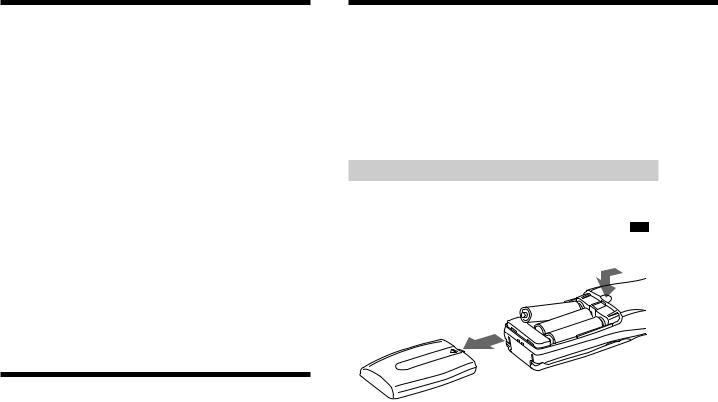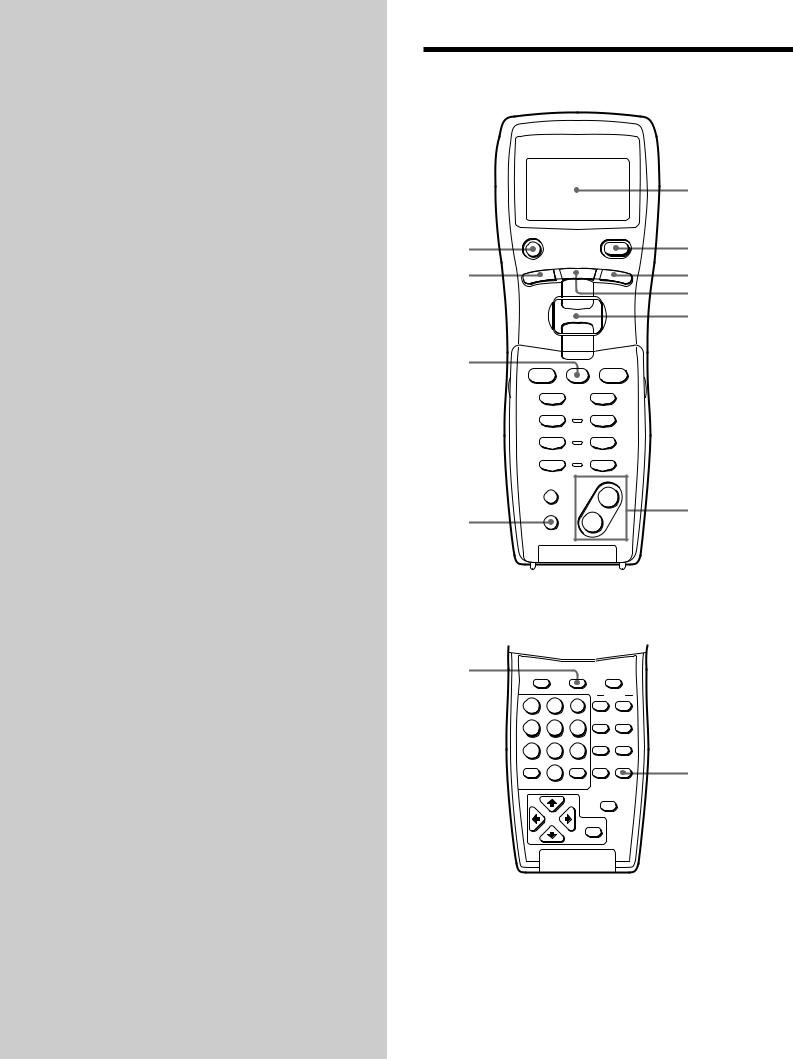Sony RM-LJ302 User Manual

3-866-295-12(1)
Remote
Commander
Operating Instructions
RM-LJ302
ã 1999 by Sony Corporation

Precautions
On safety
Should any solid object or liquid fall into the cabinet, unplug the receiver and have it checked by qualified personnel before operating it any further.
On operation
Before connecting other components, be sure to turn off and unplug the receiver.
On cleaning
Clean the cabinet, panel and controls with a soft cloth slightly moistened with a mild detergent solution. Do not use any type of abrasive pad, scouring powder or solvent such as alcohol or benzine.
If you have any question or problem concerning your receiver, please consult your nearest Sony dealer.
About This Manual
The instructions in this manual are for model RM-LJ302. Check your model number by looking at the lower left corner of the front side.
Conventions
The following icon is used in this manual:
zIndicates hints and tips for making the task easier.
Before You Use Your
Remote
Check that you received the following item with the remote:
LR6 (size-AA) alkaline batteries (3)
Inserting batteries into the remote
Insert three LR6 (size-AA) alkaline batteries with the + and – properly oriented in the battery compartment. When using the remote, point it at the remote sensor on the receiver.
] |
|
} |
] |
|
|
||
|
} |
|
} |
|
] |
|
|
z When to replace batteries
Under normal conditions, the batteries should last for about 3 months. When the remote no longer operates the receiver, replace all the batteries with new ones.
Notes
•Do not leave the remote in an extremely hot or humid place.
•Do not use a new battery with old ones.
•Do not mix the alkaline batteries and other kinds of batteries. This remote is designed for use with the alkaline batteries only.
•Do not expose the remote sensor of the receiver to direct sunlight or lighting apparatuses. Doing so may cause a malfunction.
•If you don’t use the remote for an extended period of time, remove the batteries to avoid possible damage from battery leakage and corrosion.
2

Understanding the 2 way remote system
This remote operates under a 2 way remote system. With the two way remote system, the component responds to signals sent from the remote by sending additional signals (information about the status of the component, text data, etc.) back to the remote. Thus, operations are performed as a result of communication between the remote and the component.
Remote |
|
|
|
Component |
|
|
|
||
|
|
|
|
|
When using a home entertainment system comprised of several components compatible with the 2 way remote system, please restrict 2 way remote system operation to a single component. Normally, turn off the 2 way remote system on all components except the receiver.
If you would like to turn off the receiver’s 2 way remote system, see “Setting up the 2 way remote” in the operating instructions supplied with the receiver.
Setting up the remote
At the time of shipping, the remote has not been customized to your receiver yet. Before you use the remote for the first time, do the procedure below to set up the remote so that it can control your receiver properly.
1Press 1/uon the receiver to turn it on.
2Point the remote towards the receiver and press SOUND FIELD, FUNCTION, or SUB.
 and
and  appear in the display window of the remote while it communicates with the receiver and identifies the receiver model.
appear in the display window of the remote while it communicates with the receiver and identifies the receiver model.
When the communication ends, the remote is customized and provides the operation lists that match your receiver.
TABLE OF CONTENTS
Location of Parts and Basic Remote
Operations 4
Parts Description 4
Using the Lists 12
Chart of Lists 13
Selecting a Component 14
Selecting a Sound Field 15
Programming the Remote 16
Performing Several Commands in Sequence
Automatically (Macro Play) 17
Downloading Data From the Receiver 18
Other Operations 20
Additional Information 22
Troubleshooting 22
Specifications 23
3

Location of
Parts and Basic
Remote
Operations
This chapter provides information on the location of buttons and how to use them to perform basic operations.
Parts Description
|
|
|
|
|
|
2 |
|
AV 1/u |
SYSTEM STANDBY |
|
|||
1 |
|
|
|
|
|
3 |
7 |
SOUND |
FIELD |
FUNCTION |
SET |
UP |
9 |
|
|
|
|
|
|
8 |
|
|
|
PUSH ENTER |
|
|
!¡ |
0

ª SUB ·
P  p
p
=+
0)
CH/PRESET/D.SKIP
–+
BASS |
MASTER |
BOOST |
VOL |
|
|
|
|
+ |
|
4 |
6 |
MUTING |
|
– |
|
||
|
|
|
|
|
||
|
|
vOpen up the cover. |
||||
0 |
MENU |
|
SUB |
GUIDE |
|
|
|
|
|
|
LEVEL |
|
|
|
1 |
2 |
3 |
+ |
+ |
|
|
|
|
|
CENTER REAR |
|
|
|
4 |
5 |
6 |
– |
– |
|
|
|
|
|
TEST |
|
|
|
|
|
|
TONE EQ/TONE |
|
|
|
7 |
8 |
9 |
|
|
|
|
SHIFT |
|
D.TUNING |
CURSOR |
SLEEP |
|
|
|
MODE |
5 |
|||
|
>10 |
0 |
|
|
|
|
|
- / -- |
|
ENTER |
|
|
|
EXIT/RETURN
EXECUTE
4

1AV 1/uswitch
Press to turn on or off the components that the remote is programmed to operate. For details on programming procedure, see“Programming the Remote” on page 16.
2Display window
The current status of the selected component or a list of selectable items appears here.
Note
Characters other than letters of the alphabet or numbers may be displayed incorrectly on the remote, even if they appear correctly in the display window on the main unit.
3SYSTEM STANDBY switch
Press to turn off the receiver and other Sony audio/ video components at the same time. If you want to change the function of the SYSTEM STANDBY switch so that it turns on or off the receiver only, see page 16.
Note
Before you turn on the receiver, make sure that you have turned the MASTER VOLUME control on the receiver to the leftmost position to avoid damaging your speakers.
4MASTER VOL +/– buttons
Press to adjust the volume level of all speakers at the same time.
5SLEEP button
Press repeatedly to activate the sleep function and select the duration after which the receiver turns off automatically.
6MUTING button
Press to mute the sound. The MUTING indicator on the receiver lights up when the sound is muted.
7SOUND FIELD button
Press to display the sound field list. Press again to revert back to the component information.
8FUNCTION button
Press to display the function (component) list. Press again to revert back to the component information.
See the table on page 9 for information on the buttons you can use to control each component.
If you want to change the contents of the function list to match your particular components, do the procedure “Programming the Remote” on page 16.
9SET UP button
Press to display the set up list. Press again to revert back to the component information.
0SUB button
While operating a component, press to display a list of operations that the corresponding buttons are not found on the remote. Then move the easy scroll key to select the operation, and then press the key to enter the selection. Press again to revert back to the component information.
See the table on pages 10 and 11 for information on the operations that appear when you press the SUB button.
!¡ Easy scroll key
While displaying a list, move up or down to select an item from the list, and then press to enter the selection.
Operations Remote Basic and Parts of Location
5

Operations Remote Basic and Parts of Location
Parts Description
AV 1/u |
SYSTEM STANDBY |
|||
SOUND |
FIELD |
FUNCTION |
SET |
UP |
|
|
|
||
PUSH ENTER
ª SUB |
· |
|
|
P |
p |
!™ |
|
= |
+ |
||
|
|||
0 |
) |
|
|
CH/PRESET/D.SKIP |
|
||
– |
+ |
!£ |
|
BASS MASTER BOOST VOL
+
MUTING
–
|
|
vOpen up the cover. |
||||
|
MENU |
|
SUB |
GUIDE |
|
|
|
|
|
|
LEVEL |
!¢ |
|
|
1 |
2 |
3 |
+ |
+ |
! |
@™ |
|
|
|
CENTER |
REAR |
|
4 |
5 |
6 |
– |
– |
!§ |
|
|
|
|
|
TEST |
|
|
|
|
|
|
TONE EQ/TONE |
|
|
|
7 |
8 |
9 |
|
|
!¶ |
|
|
|
|
CURSOR |
|
|
@¡ |
SHIFT |
|
D.TUNING MODE |
SLEEP |
||
>10 |
0 |
|
|
|
!ª |
|
|
|
|
|
|||
@º |
- / -- |
|
ENTER |
|
|
|
|
|
|
EXIT/RETURN |
|
||
|
|
|
|
|
||
|
|
|
EXECUTE |
|
!• |
|
!™ Tape/disc operation buttons
The following table shows what components are operated by each button and the function of the buttons.
Button(s) |
Component(s) |
Function |
· |
VCR, DVD player, |
Starts play of the |
|
LD player, video CD |
playback medium |
|
player, tape deck, |
|
|
MD deck, CD player, |
|
|
DAT deck |
|
|
|
|
ª |
Tape deck |
Starts play on the reverse |
|
|
side of the cassette |
|
|
|
P |
VCR, DVD player, |
Pauses play or recording |
|
LD player, video CD |
or starts recording when |
|
player, tape deck, |
the component is in |
|
MD deck, CD player, |
recording standby |
|
DAT deck |
|
|
|
|
p |
VCR, DVD player, |
Stops play |
|
LD player, video CD |
|
|
player, tape deck, |
|
|
MD deck, CD player, |
|
|
DAT deck |
|
|
|
|
=/+ VCR, DVD player, |
Skips tracks |
|
|
LD player, video CD |
|
|
player, tape deck |
|
|
(deck B only) , MD |
|
|
deck, CD player, |
|
|
DAT deck |
|
|
|
|
0/) VCR, LD player, tape |
Fastwinds or rewinds |
|
|
deck, MD deck, DAT |
|
|
deck |
|
|
|
|
|
DVD player, LD |
Searches tracks in the |
|
player, video CD |
forward or backward |
|
player, CD player |
direction |
|
|
|
See the table on page 9 for information on the buttons that you can use to control each component.
!£ CH/PRESET/D.SKIP +/– buttons
Press repeatedly to select a preset station, channel, track, or a disc.
!¢ LEVEL CENTER +/– buttons
Press to adjust the volume level of the center speaker.
! LEVEL REAR +/– buttons
Press to adjust the volume level of the rear speakers.
6

!§ EQ/TONE button
Press to turn the equalizer or tone effect on or off. The TONE indicator on the receiver lights up when the effect is turned on.
Note that if you have adjusted the equalization or tone using the CURSOR MODE button and cursor buttons, the adjusted equalization or tone will be produced whenever you turn on the equalizer or tone effect.
!¶ TEST TONE button
Press to output a test tone.
!• Cursor buttons (V/v/B/b)
After pressing the CURSOR MODE button or SET UP button on the receiver, use the cursor buttons to make specific settings. For details refer to the Operating Instructions supplied with your receiver.
To perform menu operations on the VCR, DVD player, or SAT tuner, do the procedure below. If you don’t do this, the cursor buttons merely operate the receiver.
1Press FUNCTION and move the easy scroll key to select the VCR, DVD player, or SAT tuner.
2Open up the cover on the remote. CURSOR TYPE list appears.
If the list has disappeared before you go on to Step 3, press any of the cursor buttons to restore the list.
3Move the easy scroll key to select the component that you selected in Step 1, then press the key to enter the selection.
EXECUTE button
After pressing the MENU or GUIDE button, use the cursor buttons to select a menu item, then press the EXECUTE button to enter the selection.
EXIT/RETURN button
Press to return to the previous menu or exit the menu while VCR, DVD, or SAT menu or SAT guide is displayed on the TV screen.
!ª CURSOR MODE button
Press repeatedly to select a cursor mode, SURROUND, BASS/TREBLE (EQ), etc. The indicator for the selected cursor mode lights up on the receiver.
@º D.TUNING ENTER button
If you have selected tuner:
Press to enter Direct Tuning mode. For details on Direct Tuning procedure, refer to the Operating Instructions supplied with your receiver.
If you have selected VCR, DVD player, LD player, TV, cable box, satellite tuner, tape deck, MD deck, CD player, or DAT deck:
After selecting a channel, disc, or track using the numeric buttons, press this button to enter the selection. For details, refer to the Operating Instructions supplied with your receiver.
@¡ SHIFT >10 -/-- button
If you have selected tuner:
Press repeatedly to select a memory page for presetting radio stations or tuning to preset stations.
If you selected VCR, TV, cable box, satellite tuner, LD player, video CD player, tape deck, MD deck, or CD player:
Press before inputting a channel, disc, or track number of eleven or higher. For details, refer to the operation manual supplied with the respective components.
@™ Numeric buttons (1 to 0)
Inputs the correponding numeric value. On some components, pressing 0 selects 10. For details, refer to the operation manual supplied with the respective components.
Operations Remote Basic and Parts of Location
7
